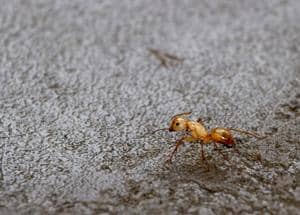Is your sleep disrupted by painful ant bites? Are you experiencing bad sleep quality due to being awakened multiple times every night? The reasons for that could be different and an ant infestation is one of the most common.
In this guide, I will tell you how to get rid of ants in bedroom . Below, you will learn all the possible reasons for a bedroom ant infestation along with the most effective remedies to stop it and return to the normal pace of life. Stay with me till the end of the article to discover all the useful facts and tips.
Why Do I Have Ants in My Bedroom?
Similar to all other insects, ants seek secure shelters and feeding sources all the time. That’s why they end up settling down in our households so often.
They can easily find cracks in the walls and ceiling, inhabit rotting floorboards, attack carpets to withdraw breadcrumbs, etc. But things that attract them in the first place include:
- Moisture and warmth – in most cases, ants find both resources outdoors, but when the weather gets too hot and dry or cold and dry, ants may enter your house if they feel moisture and warmth coming out of cracks in walls, attic, basement, pipelines, etc.
- Poor sanitary conditions – poorly maintained households are perfect for many kinds of pests, including ants. They are especially attracted by food leftovers, spilled sweet drinks, and old trash. You should keep the house clean and timely repaired to lower the chances of infestations. Even an empty can of coke on a drawer may lure an entire ant colony inside your house if there’s a way to enter!
- Plants – some plants, including hostas, roses, penstemons, and clematis are very attractive to ants and may lure them inside your house even if they grow outdoors closely to your house exterior. Consider growing these plants at a distance to make it harder for ants to migrate indoors.
What attracts ants to bedroom?
If ants invade your bedroom, they have probably occupied the entire house already. All the listed infestation reasons from the previous paragraph work the same for your entire house.
An infestation in the bedroom can be triggered by rotting floorboards in the room, poor sanitary conditions, food leftovers, etc.
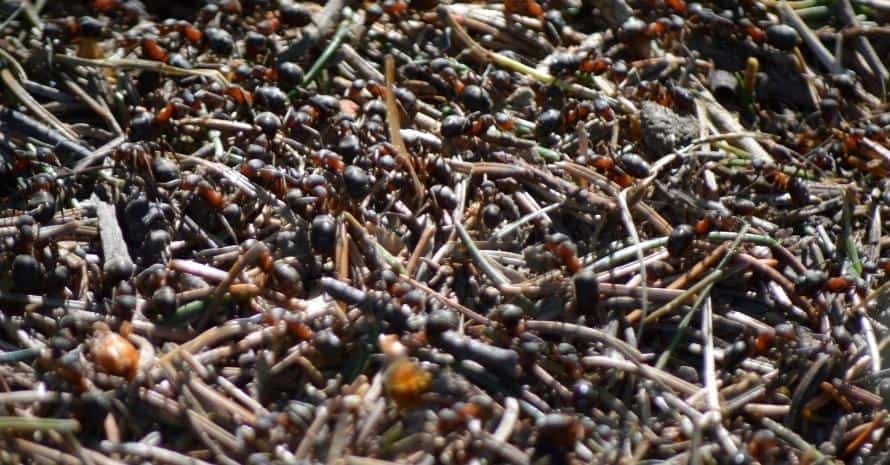
If you find ants right in your bed, you should question yourself if the sheets are changed regularly or not and probably stop eating in the bedroom.
Your bedroom may also have a convenient entry point for insects, while the only reason for them to get in is warmth. This is the most common scenario for winter ant infestations as they need warmth for mating.
Possible dangers of having ants in bedroom
Most ant types can’t be called a serious problem if they get into your bedroom, but some species can bite or sting you painfully. Besides, any ants can disrupt your sleep and lead to lower daily productivity and the overall quality of life.
Moreover, some ants may transmit diseases, especially those foodborne bacteria brought from trash cans in the street, including Salmonella, and other anti-sanitary places. Some people are also allergic to ants and their bites.
This being said, it’s as necessary to get rid of ants as of any other household pests, even if they don’t seem that nasty at first sight.
Where do they come from?
Figuring out what attracts ants in the bedroom, we also need to consider where they come from as well. Given that ants usually invade households searching for food and water, kitchens and dining rooms are usually their primary targets.
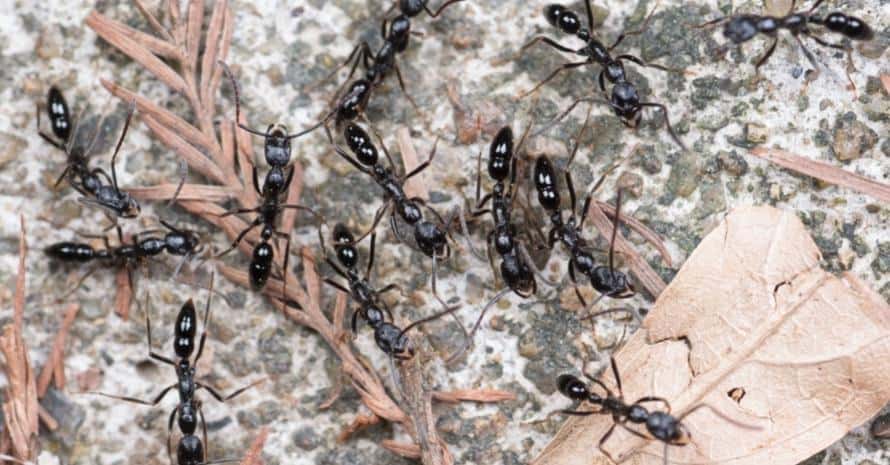
At the same time, they need a secure hideaway to create a nest for the colony and gather food there. If your bedroom has at least a tiny bite of food leftovers or, say, empty coke cans, there’s no surprise if you see ants wandering on and under your bed, in wall cracks, under the carpet, and elsewhere.
Bedroom ants are usually found in:
- Bedroom carpets – carpets are often a source of food crumbs for ants, so don’t get surprised if you see them roaming there. Besides, the floorboards under the carpet may occur to be rotting. Rot attracts ants as it’s a good source of moisture.
- Bedroom closet – although ants don’t eat fabric, they still can inhabit your closet if they find some leftovers there or consider it a safe hideaway.
- Bedroom ceiling – if you notice ants coming down from the ceiling, it’s worth inspecting your attic and roof immediately to find the issue that attracts ants inside.
- Mattress – although it’s the rarest place ants inhibit, you still can ding their nests under or right inside your mattress. If ants bite you in the night, there’s probably a hideaway somewhere inside the bed or nearby.
Types of Ants in Bedroom
Of course, not all ant types would prefer settling down in your house as it’s so different from their natural habitat. Unfortunately, most ant types think differently and feel great in houses as they find them perfect sources of food, water, and shelter. Below is a list of ant species that will happily make you a visit:
Black ants
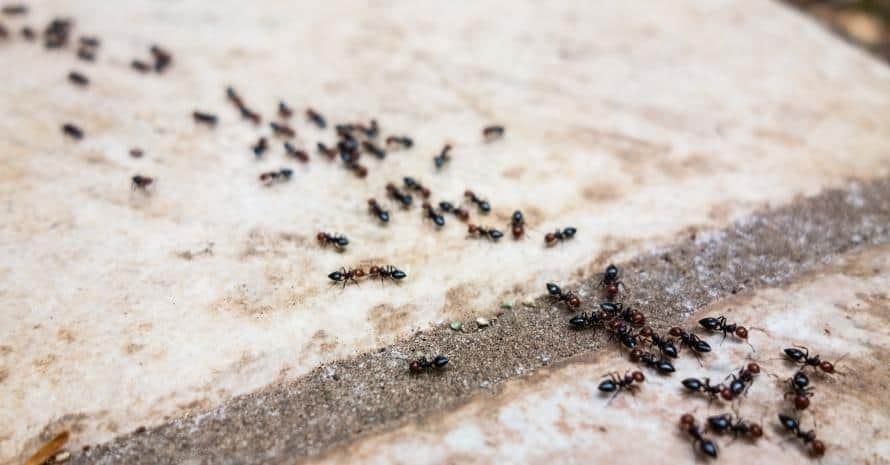
Black ants can be easily mixed up with pharaoh and carpenter ants. You can tell them one from another by the coloration. Black ants are entirely black and don’t have any brownish spots.
The nests of these ants can be often found in rotten floorboards or walls, so check your bedroom and entire house for any signs of nests in these places.
Little ants
The most common types of little ants found in households and bedrooms are acrobat ants, ghost ants, and big-headed ants. Similar to other ants, these ones may invade your bedroom in search of shelter in the floorboards, walls, or furniture.
Little brown ants
Little brown ants deserve special attention as they emit a disgusting smell if you squash them accidentally. These guys usually hide in dry spaces close to a food source.
Carpenter ants
These large ants can reach up to 3/32” in length, which is already scary. However, the biggest issue of having them in your house is that they chew wood and can destroy entire wood slabs in your house.
Carpenter ant damage can be as serious as termite damage and requires immediate professional extermination to avoid costly repairs. If you find at least one of them, inspect the entire house for sawdust and holes in wooden structures.
They usually choose the wood that’s moist or rotten to quench thirst and supply their colonies with water.
Flying ants
These ants appear during the mating period. If there’s a nest in your house, flying ants may invade your bedroom and other rooms all of a sudden. This usually happens in winter because ants look for warm shelters to start mating.
Sugar ants
These small fellas with black heads and reddish bodies aren’t biting, but can invade households in immense hordes, especially if there’s something sweet around.
Red ants (fire ants)
Fire ants are very common and well-known for their painful stings that cause a burning sensation. They are very small but can cause a lot of problems to households as they attack anyone who’s disturbing them one way or another.
Step by Step Guide on How to Get Rid of Ants in Bedroom
The ways to get rid of ants in your room don’t depend on the room’s purpose, so the extermination process for the bedroom is the same as any other part of the house. Below is a detailed step-by-step instruction on how to stop the ant infestation.
Step 1: Where do they come from?
It’s quite easy to kill all the ants that you see around the house, but it won’t solve the problem. What you really need is to find a place where the colony’s nest is based.
If the nest is hidden somewhere inside the walls or under the floorboards, it will be impossible to see it. Fortunately, ant baits will help you deliver the poison inside to eliminate the colony from within.
Step 2: Do the cleaning
It’s important that you clean the entire house and your bedroom before and after the extermination. You should keep the house clean all the time to reduce the probability of re-infestation in the future.
Step 3: Select a remedy
The most effective remedies against ants are ant baits. The principle of their work is quite simple – worker ants smell the nutritious bait and go for it to bring more food to their queen. Once the bait is delivered inside the nest, the ant queen dies and the entire colony dies out quite quickly.
If you find a congregation of ants that is within direct reach, you can eliminate it using an ant pesticide spray, powder, or diatomaceous earth.
All three options are deadly, but powders and diatomaceous earth are easy to vacuum once the ants are dead. You still need to remember the safety handling rules for diatomaceous earth and pesticide powder.
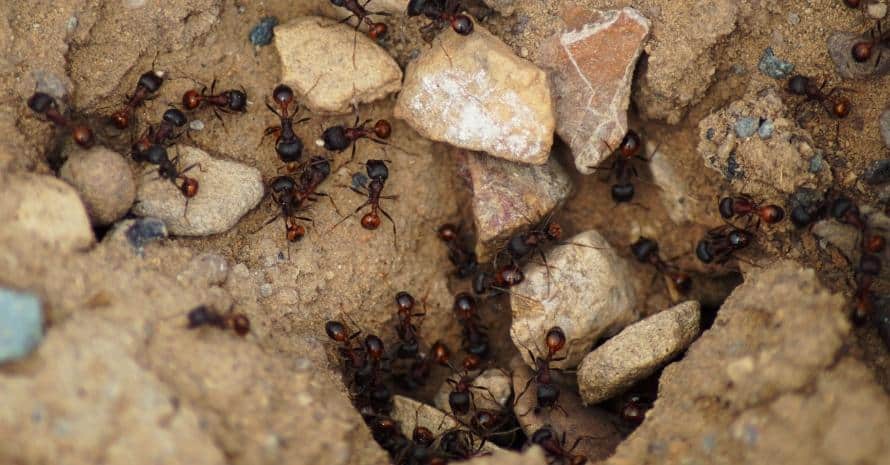
Sprays will leave toxic residue, especially if you apply them to fabrics. Sprays can also damage natural fibers in carpets, curtains, etc.
In my opinion, a combo of baiting and direct killing with diatomaceous earth is the best way to eradicate ant colonies for sure. Make sure to apply diatomaceous earth to ant trails so that they find the powder all of a sudden.
The powder particles are very small and sharp, which lets them damage ant exoskeletons from within and dehydrate them to death.
What about natural & DIY remedies?
If you are strictly against chemical pest control remedies, you may try some of the items listed below to control the ant problem. Don’t forget that all these remedies are less effective than the ones in the previous paragraph, except for diatomaceous earth, which is great against many household pests. Here they are:
- Lemon juice – ants hate acidic stuff, so lemon juice and peels (whatever you like) can scare them away for some time.
- Orange juice – this fruit works the same as lemons.
- Vinegar – you can quickly make a vinegar insecticidal spray by mixing water and vinegar (1:1). This highly acidic liquid will scare ants away from their trails for some time. It’s necessary to reapply the spray several times a day because vinegar evaporates very quickly.
- Ground pepper – sprinkling ground pepper near ant entry holes will stop them from entering your room due to the odor.
- Peppermint – peppermint smell is quite an effective deterrent for most kinds of pests. However, you need to reapply peppermint spray at least twice a day to make it work.
How to Prevent Future Infestations
Once the ant extermination is complete and your house is only for you again, you should not relax on the sofa just yet. Before that, you have to ensure that your household is protected against re-infestations.
It means that you need to eliminate all the issues that resulted in the recent ant invasion, including:
Cracks and holes in walls, foundation, and elsewhere – all the entry holes in the house exterior are potential entries for all sorts of household pests, so it’s necessary to seal them thoroughly as soon as possible.
Water leaks, condensation, etc. – water leaks don’t only increase your yearly utility bills, but also attract all kinds of household pests that can’t find enough water outdoors. Continuous leaks and condensation may also end in property damage that is expensive to repair. Find and repair all the problem sources.
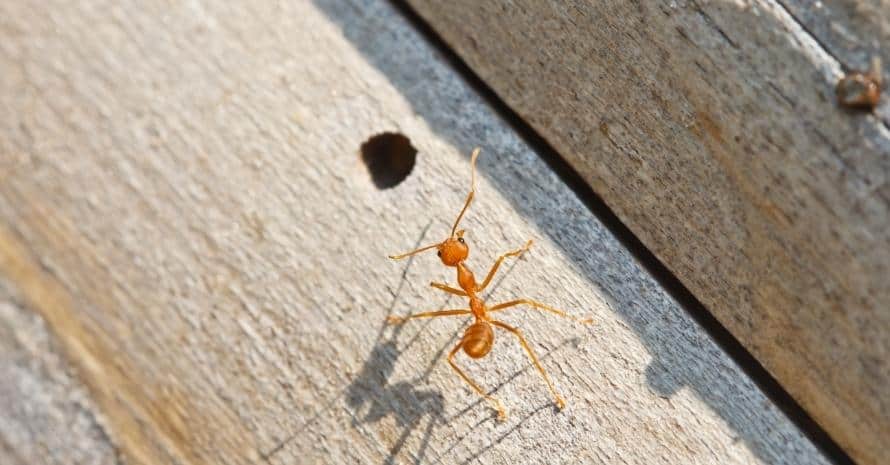
Apply repellents – for an even greater protective effect, you can regularly apply universal exterior insect repellents to keep pests at bay all year long.
DIY natural repellents are also an option, but they are generally less effective and don’t provide a sustained effect, especially if it’s raining frequently in your region.
Keep your house clean – both indoor and outdoor spaces of your household may attract various kinds of pests by providing them with food and water.
Keeping your house and yard clean is more effective than any repellents as it eliminates the very reason for infestations and controls insect populations effectively.
Grow ant-deterring plants in the garden – rosemary, lavender, tansy, mint, thyme, peppermint, and catnip are all the plants that ants hate. Growing them in the yard can be an effective addition to other remedies during the warm months.
Don’t rely on these remedies too much, though, as insects can find many ways to pass by the scary smells.
FAQ on Bedroom Ants
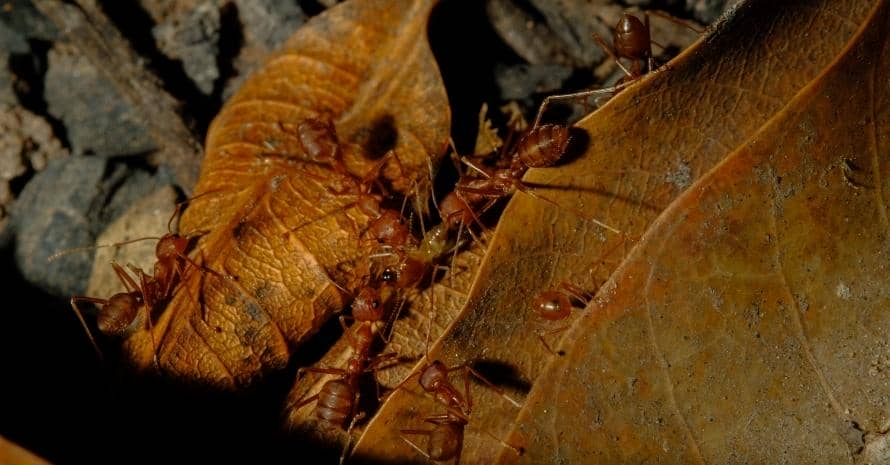
Here are a few more quick facts about ants in the bedroom.
Why are there ants in my room?
If you stumble upon any type of ants in your house, the chances are high that something attracted them inside. Besides, it indicates that there is at least one way to enter your house to reach the prey.
Ants are usually attracted by warmth, moisture, and food leftovers scattered around the house. They may even feel a tiny coke spillage on your carpet.
Is it normal to have ants in your bedroom?
It’s not normal to have any pests in your house. Their presence indicates that your dwelling is not clean enough and/or has access points on the exterior.
Don’t underestimate ant infestations as they may be followed by more serious insect invasions if you don’t protect your house well enough. Species like carpenter ants can also damage your house and even signalize that there are termites in your house as well.
Can ants crawl in your bed?
It doesn’t happen often, but ants can really infest your bed if they find anything to feed on there or decide to establish a nest inside or under your mattress. Your bed can also be a transit point on the ant trail from a food source to the ant nest.
How to get rid of ants in bed?
First of all, you need to deep clean your bedroom and wash the sheets thoroughly. It’s also necessary to install baits and seal all the possible entry holes around the room to prevent the ants from coming back in the future. Check out for any signs of ants inside or under the mattress too.
Will ants go away on their own?
If you don’t want to apply any chemical or natural pesticides, you can make most kinds of ants go away in 7-10 days if you remove all the food and water sources by thoroughly cleaning and repairing your house.
But do you really need to do that if you can solve the problem fast in other ways? Besides, such species as carpenter ants won’t go away until you exterminate them in wood structures completely.
Sleep Well!
At last, your bedroom and the entire house will be liberated from ants! Follow the instructions of my guide and you have all the chances to get rid of this problem.
However, if the infestation is too severe, you should hire a professional to avoid further complications and costly repair works in the future. Was my guide helpful?
If not, you are welcome to ask me any additional questions in the comments section. If you have a different pest problem, you may find a relevant extermination guide in my online archive on this website.
Also read:
References
- A Guide to Safe Handling of Diatomaceous Earth Products European Version(International Diatomite DPA Producers Association)
https://ehs.psu.edu/sites/ehs/files/idpa_guide_for_safe_handling.pdf - Carpenter Ants(Entomology at the University of Kentucky)
https://entomology.ca.uky.edu/ef603 - Ants(University of Minnesota Extension)
https://extension.umn.edu/insects-infest-homes/ants

